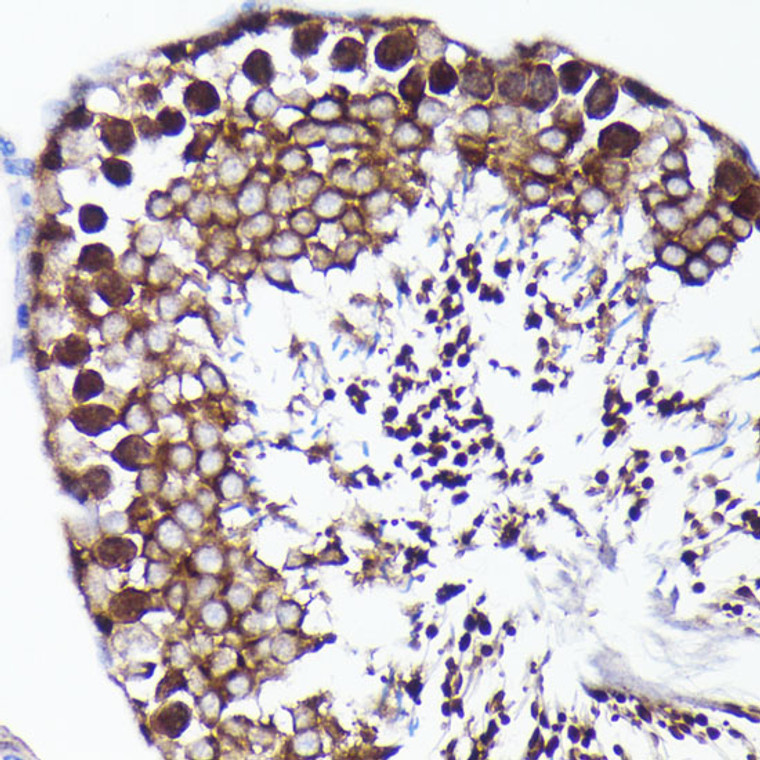| Host: |
Rabbit |
| Applications: |
WB/IHC |
| Reactivity: |
Human/Mouse/Rat |
| Note: |
STRICTLY FOR FURTHER SCIENTIFIC RESEARCH USE ONLY (RUO). MUST NOT TO BE USED IN DIAGNOSTIC OR THERAPEUTIC APPLICATIONS. |
| Short Description: |
Rabbit monoclonal antibody anti-PRMT5 (1-100) is suitable for use in Western Blot and Immunohistochemistry research applications. |
| Clonality: |
Monoclonal |
| Clone ID: |
S2MR |
| Conjugation: |
Unconjugated |
| Isotype: |
IgG |
| Formulation: |
PBS with 0.02% Sodium Azide, 0.05% BSA, 50% Glycerol, pH7.3. |
| Purification: |
Affinity purification |
| Dilution Range: |
WB 1:500-1:2000IHC-P 1:50-1:200 |
| Storage Instruction: |
Store at-20°C for up to 1 year from the date of receipt, and avoid repeat freeze-thaw cycles. |
| Gene Symbol: |
PRMT5 |
| Gene ID: |
10419 |
| Uniprot ID: |
ANM5_HUMAN |
| Immunogen Region: |
1-100 |
| Immunogen: |
A synthetic peptide corresponding to a sequence within amino acids 1-100 of human PRMT5 (O14744). |
| Immunogen Sequence: |
MAAMAVGGAGGSRVSSGRDL NCVPEIADTLGAVAKQGFDF LCMPVFHPRFKREFIQEPAK NRPGPQTRSDLLLSGRDWNT LIVGKLSPWIRPDSKVEKIR |
| Tissue Specificity | Ubiquitous. |
| Function | Arginine methyltransferase that can both catalyze the formation of omega-N monomethylarginine (MMA) and symmetrical dimethylarginine (sDMA), with a preference for the formation of MMA. Specifically mediates the symmetrical dimethylation of arginine residues in the small nuclear ribonucleoproteins Sm D1 (SNRPD1) and Sm D3 (SNRPD3).such methylation being required for the assembly and biogenesis of snRNP core particles. Methylates SUPT5H and may regulate its transcriptional elongation properties. May methylate the N-terminal region of MBD2. Mono- and dimethylates arginine residues of myelin basic protein (MBP) in vitro. May play a role in cytokine-activated transduction pathways. Negatively regulates cyclin E1 promoter activity and cellular proliferation. Methylates histone H2A and H4 'Arg-3' during germ cell development. Methylates histone H3 'Arg-8', which may repress transcription. Methylates the Piwi proteins (PIWIL1, PIWIL2 and PIWIL4), methylation of Piwi proteins being required for the interaction with Tudor domain-containing proteins and subsequent localization to the meiotic nuage. Methylates RPS10. Attenuates EGF signaling through the MAPK1/MAPK3 pathway acting at 2 levels. First, monomethylates EGFR.this enhances EGFR 'Tyr-1197' phosphorylation and PTPN6 recruitment, eventually leading to reduced SOS1 phosphorylation. Second, methylates RAF1 and probably BRAF, hence destabilizing these 2 signaling proteins and reducing their catalytic activity. Required for induction of E-selectin and VCAM-1, on the endothelial cells surface at sites of inflammation. Methylates HOXA9. Methylates and regulates SRGAP2 which is involved in cell migration and differentiation. Acts as a transcriptional corepressor in CRY1-mediated repression of the core circadian component PER1 by regulating the H4R3 dimethylation at the PER1 promoter. Methylates GM130/GOLGA2, regulating Golgi ribbon formation. Methylates H4R3 in genes involved in glioblastomagenesis in a CHTOP- and/or TET1-dependent manner. Symmetrically methylates POLR2A, a modification that allows the recruitment to POLR2A of proteins including SMN1/SMN2 and SETX. This is required for resolving RNA-DNA hybrids created by RNA polymerase II, that form R-loop in transcription terminal regions, an important step in proper transcription termination. Along with LYAR, binds the promoter of gamma-globin HBG1/HBG2 and represses its expression. Symmetrically methylates NCL. Methylates p53/TP53.methylation might possibly affect p53/TP53 target gene specificity. Involved in spliceosome maturation and mRNA splicing in prophase I spermatocytes through the catalysis of the symmetrical arginine dimethylation of SNRPB (small nuclear ribonucleoprotein-associated protein) and the interaction with tudor domain-containing protein TDRD6. |
| Protein Name | Protein Arginine N-Methyltransferase 5Prmt572 Kda Icln-Binding ProteinHistone-Arginine N-Methyltransferase Prmt5Jak-Binding Protein 1Shk1 Kinase-Binding Protein 1 HomologSkb1 HomologSkb1hs Cleaved Into - Protein Arginine N-Methyltransferase 5 - N-Terminally Processed |
| Database Links | Reactome: R-HSA-191859Reactome: R-HSA-3214858Reactome: R-HSA-6804760 |
| Cellular Localisation | CytoplasmNucleusChromosomeGolgi ApparatusLocalizes To Promoter Regions Of Target Genes On ChromosomesLocalizes To Methylated Chromatin |
| Alternative Antibody Names | Anti-Protein Arginine N-Methyltransferase 5 antibodyAnti-Prmt5 antibodyAnti-72 Kda Icln-Binding Protein antibodyAnti-Histone-Arginine N-Methyltransferase Prmt5 antibodyAnti-Jak-Binding Protein 1 antibodyAnti-Shk1 Kinase-Binding Protein 1 Homolog antibodyAnti-Skb1 Homolog antibodyAnti-Skb1hs Cleaved Into - Protein Arginine N-Methyltransferase 5 - N-Terminally Processed antibodyAnti-PRMT5 antibodyAnti-HRMT1L5 antibodyAnti-IBP72 antibodyAnti-JBP1 antibodyAnti-SKB1 antibody |
Information sourced from Uniprot.org
12 months for antibodies. 6 months for ELISA Kits. Please see website T&Cs for further guidance









